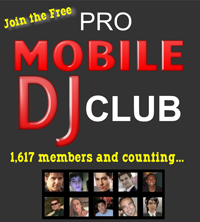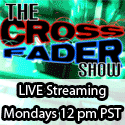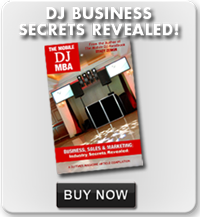by Stu Chisholm - “The Complete Disc Jockey”
As you read this, mobile DJs the world over are excited about all of the upcoming DJ shows and expos that come around each year.
Mobile Beat’s 16th Las Vegas extravaganza is just about to take place. DJ Times has its own show in Atlantic City, and the ADJA has been busy promoting their own Las Vegas expo.
Up north, Canadian DJs are anticipating the Canadian DJ show in March. (I’ll be presenting there on Saturday the 17th!)
This boom in shows and expos are, to me, a mixed bag. While it’s always great to network with industry colleagues and take in demonstrations of new equipment and software, seminars, workshops and classes, there is a “dark side,” like the Force in Star Wars, that DJs who aspire to greatness need to avoid: the “follow the leader” syndrome.
Something New for Your Bag of Tricks
It works like this: an entertainer develops a groundbreaking new technique that gives them some notoriety. To maximize their investment in time and energy developing it, they develop a workshop or seminar to teach it to others.
Soon that unique idea becomes THE NEXT BIG THING, and DJs scramble to incorporate it into their bag of tricks.
Before long it’s no longer unique. It’s not even valuable to the originator, as their former students put up videos of their version on YouTube or their company website, or detail it on various DJ forums, allowing anyone and their dog to steal the idea, virtually free. (Can you say, “Love Story?” This creates pressure in the industry to come up with even more… the NEXT next big thing.
The Homogenization Effect
Even worse, this also has a homogenization effect, turning every DJ into a clone of the next, that “unique” idea becoming expected and maybe even a bit predictable and boring.
One day, that course you spent so much time, money and effort on will be the butt of jokes on late night talk shows. What then?
When I first saw Todd Mitchem in Chicago, he was demonstrating his “Let’s Get Interactive” program, which combined time-tested audience control and participation techniques with unique routines he’d create for various types of parties and functions.
It was groundbreaking in the sense that he left those routines open-ended: YOU had to create your own! He basically just gave you the most basic template, via his own examples, along with some examples of why some things were done while others were not.
Sad to say, this also may have been its downfall: Todd’s program required at least a little bit of creative skill. DJs could see (and even feel, when Todd did his routine at the show) how effective and exciting the concept was, yet they also saw that they’d have to invest some time and effort into creating and rehearsing a decent routine. They couldn’t just buy it and take it home. It wasn’t a process demonstration where they could take notes; “first you do this, then next you do this…”
While I heard nothing but compliments after his show from DJs who at first said, “Who the heck is THIS guy,” Todd’s video/book sales seemed lackluster to this casual observer. Roughly seven years later, in 2007, Todd liquidated the last of his “Let’s Get Interactive” DVDs to move on to more profitable ventures.
Sad, because Todd’s methods have had a bigger impact on my performance and made me more money than a whole lot of other things I have tried ever since.
Put Your Own Spin On It
Yet this remains the point of all the performance instruction and seminars presented at DJ expos. Yes, you’re supposed to learn and incorporate what you’ve learned into your show. If you didn’t, it would all be a waste of time.
The point is that you aren’t supposed to simply copy what you learn, but to put your own spin on it! Make it something unique and special, so that you aren’t doing exactly what your main competitor who is also attending the show is doing.










